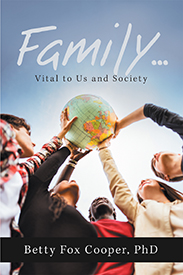
 |
Cooper had taught home economics for twenty-four years, yet was surprised to observe firsthand that often modern family members lack basic life skills as taught in home economic classes. After clashing with a new principal forced her to leave school, the author walked into a second career researching for and teaching community service classes. Following her husband's 2018 death, she continued research into the value that family brings to stabilize each individual.
The definition of family per the American Home Economics Association is "a unit of transacting and independent persons who share some values and goals, responsibility... and have commitment to one another over time." Members of healthy families are neither too close nor too far apart. They may drift out of balance at times but move together back into balance. Senior family members, especially elder parents and grandparents, serve as valuable role models whose influence can last an entire lifetime. Partners of healthy families likewise share a dyadic communication, or resonance, across minds. The author missed that shared communication after the passing of her husband.
In her book, Cooper clearly expresses the worth of dedicated family relationships, using expert opinions and case studies to make her points. The author's own experience at looking back candidly reveals how service given to others can help a person recover from grief and resulting depression. Her book includes a touching and extensive pictorial memoir of Cooper's heritage with supporting photos, demonstrating how newer research applies to families and their communities. Readers who took home economics in the 50s through 70s will likely be pleasantly surprised at the spot-on theory the author shares regarding family relationships and life skills teaching.